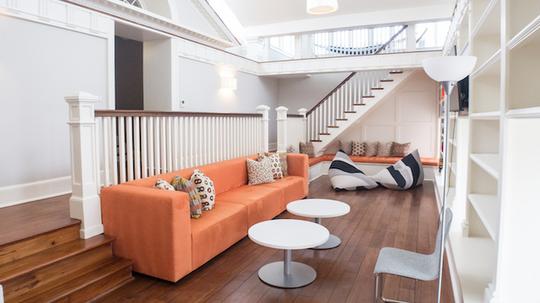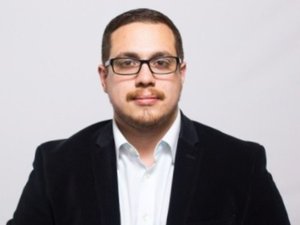
The scene at the Halcyon House is what I would imagine the beginnings of a new-age Renaissance to look like.
Outside is an old, brick Georgetown home. Inside is a renovated, multi-stairwell, large-window building overlooking the Potomac River. High-rise ceilings, lofted libraries and idea boards for entrepreneurs are scattered throughout the home. A garden overlooking the river is kept up and provides ample space for morning yoga. It's meant to be nurturing and create a comfortable space of an entrepreneur's ideas to flourish—or, at least, that's what Halcyon CEO Kate Goodall and Halcyon Incubator program director Ryan Ross are going for.
Halcyon is the home of the Halcyon Incubator, which, until recently, was operated by the S&R Foundation. In late February, the incubator spun out of the foundation and folded into the newly formed Halcyon nonprofit. Think of the change like Google's reorganization with the formation of Alphabet. With the new structure, Halcyon as an organization is better equipped for some of the larger plans on Goodall's mind.
Take, for instance, the Halcyon Arts lab, now taking applications for its first cohort. The nine-month fellowship brings in local artists with big ideas, gives them a free studio space and pairs them with a high student from Wards 7 or 8 to mentor through an artistic project. Other initiatives include the development of Halcyon Stage, which plans to host events ranging from a Stravinsky's "Rite of Spring"-inspired rave to intimate Q&A sessions, or Halcyon Dialogue, a series of panel discussions with D.C. innovators and policy makers.
"We like to think of ourselves as taking the most audacious, the most creative," Goodall told DC Inno. "But everyone can be creative."
The new programs all fit nicely into what Halcyon has built itself on: cultivating ideas that can change the world. Now, yes, that's a lofty, ambiguous goal—especially for a group that was formed a month ago and whose anchor program is roughly three years old. But Goodall knows the team has a good thing going for it.
Halcyon Incubator's sixth cohort just got settled in, and Ross says he easily receives over 200 applications for eight spots. It makes sense. Unlike most other D.C. area incubators, Halcyon provides five months of housing in the house, a living stipend, an 18-month program that lets founders focus on their ideas and access to Halcyon's wide network of professional investors and policy makers. Oh, and they don't take any equity in the startups or nonprofits that come through.
The incubator, alone, attracts ideas like Chibueze Ihenacho's ARMR System, a wearable medical device company aimed to help people stop traumatic bleeding before EMTs arrive on the scene. It's also the home of Kevin Lee's Mobilized Construction, a software platform that hopes to make the process of building dirt roads and other road maintenance a whole lot easier. Many of the Halcyon alumni have landed on the Forbes 30 Under 30 list and are making names for themselves in the D.C. innovation community. (Take Heartful.ly's Kate Glantz as an example.) They're ideas based in social enterprise and fixing a problem in the world. That's the most important piece that Ross looks for in Halcyon Incubator applications.
"Being a talented founder is understanding the core pain point of what you're working on and what that solution is," Ross said. "So many times, especially in social enterprise, those people are people who have experienced that pain point. They have that intuitive sense of how they can stay in line with what they're solving in the marketplace."
Ross also said he looks for innovation in the idea and markets, sustainability of the business model (which means nonprofits need to bring in revenue or sell a product) and lastly, they look for impact. "They need to have impact at the core of what they're doing," Ross said.

For all that Halcyon gives to artists, entrepreneurs and others, you might assume that it operates with an endowment. But you would be wrong. Like many great artistic and social ventures, Halcyon, currently, exists with the support of one major philanthropic donation from its founder Sachiko Kuno, who donates the building and utility costs each year. (Much like how many media projects exist with the support of the Knight Foundation or other artistic endeavors exist with the Carnegie name attached to it.) The rest of the $2.5 million to $3 million in program expenses comes from other external sponsors of the programs.
But Goodall says that with the new structure, they're hoping to change that setup a bit. "It's not going to be drastic, but we'll be more empowered to raise that external funding," Goodall said. "We're thinking continued sustainability and I think an endowment will be in the cards at some point."
On top of bringing together all of these new programs into the Halcyon fold, the team is also gearing up for its second annual Social Enterprise Impact Report, which works to survey social entrepreneurs in various U.S. hubs. "By day, we do the incubator and by night, we do this social enterprise impact report," Ross said.
The report plays into Halcyon's continued efforts to be the player in social enterprise and anchor itself further as a national voice based in D.C.
Yet, with all of the change happening in the organization, one thing won't change anytime soon: location.
"It's definitely part of our hypothesis. This is the city for us to be in," Goodall said. "We have access to the world through these massive NGOs and embassies. We have the federal government, public and private sectors. We have never had problems finding great mentors because you could throw a rock and hit someone brilliant in D.C."
Images courtesy of Halcyon




